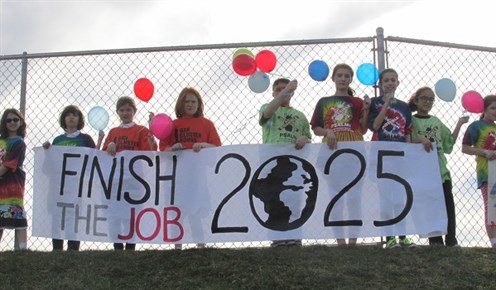04 April 2016
Mark 4 April: Finish the Job by 2025

Members of West Virginia Campaign to Ban Landmines and Cluster Bombs, Proud Students Against Landmines and Cluster Bombs, USA. 3 April 2016
Today the International Campaign to Ban Landmines and its members all over the world mark 4 April, the day for International Mine Awareness and Assistance in Mine Action, with action. 4 April aims at raising awareness on ongoing dangers caused by landmines and explosive remnants of war around the world.
To mark 4 April campaigners from Lebanon to Cambodia, from Italy to Myanmar, from Bosnia and Herzegovina to the United States, from Albania to Germany and in every region of the world are taking actions such as: lobbying meetings with decision makers; writing letters to Ministers, Parliamentarians and Presidents; conducting media work and publishing press releases; briefing diplomats or other supporters of the campaign; organizing public events (workshops, round tables, raising awareness among students, concerts or a flash-mobs); staging photo exhibitions; blogging; launching petitions or social media campaigns to advance implementation and universalization of the Mine Ban Treaty and to achieve a mine free world by 2025. These ongoing campaigns, while celebrating achievements towards a mine free world and assistance to landmine victims, also show that landmines are still a global problem – support is needed from the international community until the job is done.
The Mine Ban Treaty continues to be an exemplary and landmark international humanitarian treaty that delivers every day and in every corner of the world. As a result of this treaty, so many lives and limbs have been saved; thirty countries have become landmine free; over 49 million stockpiled landmines have been destroyed; production and transfer of landmines have virtually ceased and over eighty percent of the world has joined the treaty. These are strong indicators of major progress toward the goal of a mine free world.
However, significant challenges must be faced as landmines continue posing serious threats around the world. For example, in 2014 government forces in three countries (Myanmar, North Korea, and Syria) and by non-state armed groups in ten countries (Afghanistan, Colombia, Iraq, Libya, Myanmar, Pakistan, Syria, Tunisia, Ukraine, and Yemen) used landmines. Every four hours someone, somewhere, falls victim to a mine accident and casualties by landmines and explosive remnants of war in 2014 increased by 12% compared to casualties in 2013. Fifty-seven states and four other areas still remain affected and contaminated by landmines and 35 states have yet to join the treaty. Despite the remaining need, in 2014, funds to mine action activities decreased by 5% and many members of the campaign are increasingly facing serious financial shortages to carry out critical work clearing landmines and assisting victims.
The International Campaign to Ban Landmines firmly believes that all States Parties to the Mine Ban Treaty can finish the job by 2025. However, this goal cannot be achieved without strong determination and unwavering political and financial support to implement the Mine Ban Treaty. Taking this opportunity, we call on all states, in particular on States Parties to the Mine Ban Treaty, to continue the fight against landmines and use every moment and opportunity to advance the goal of a mine –free world by 2025.
The International Campaign to Ban Landmines, hand in hand with States Parties and all other partners and actors, will not spare any effort to achieve a mine free world by 2025.


